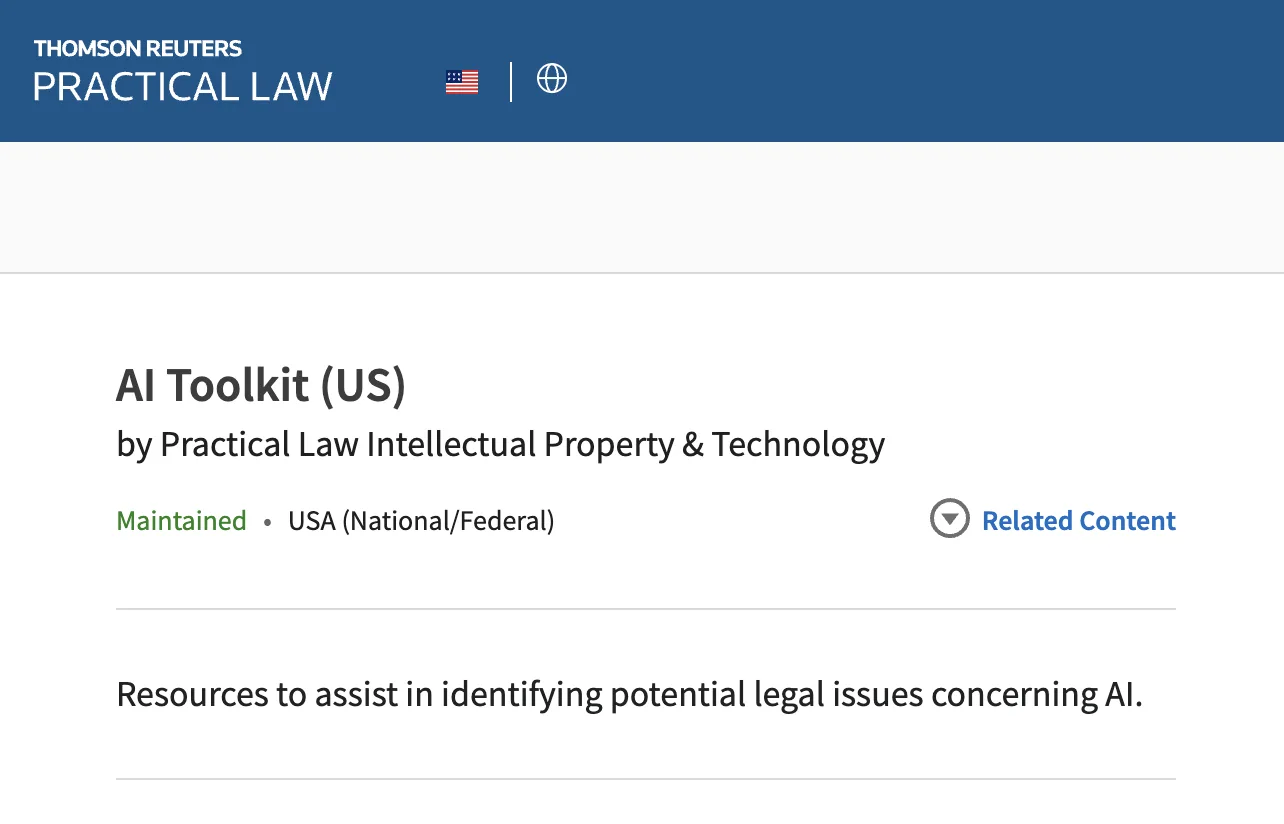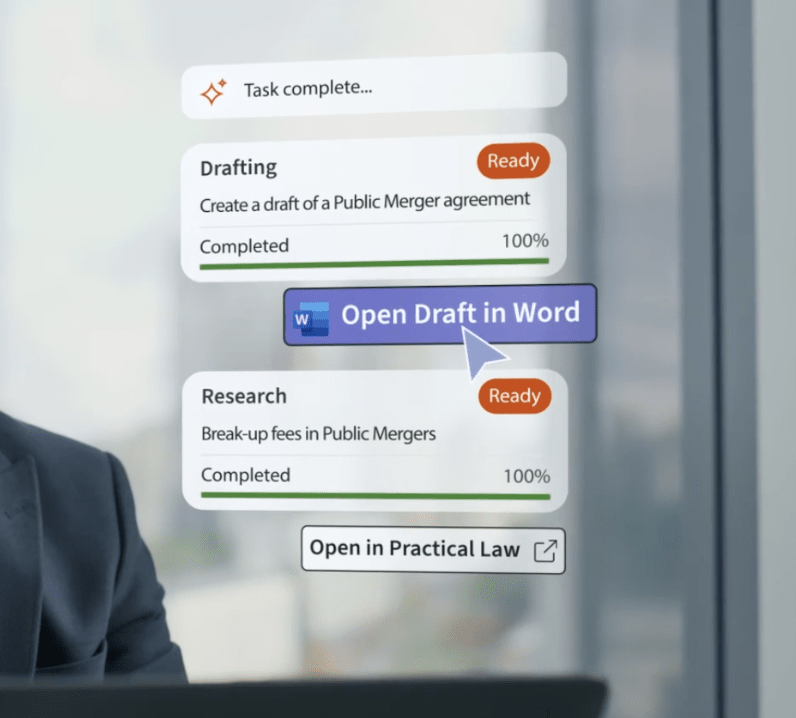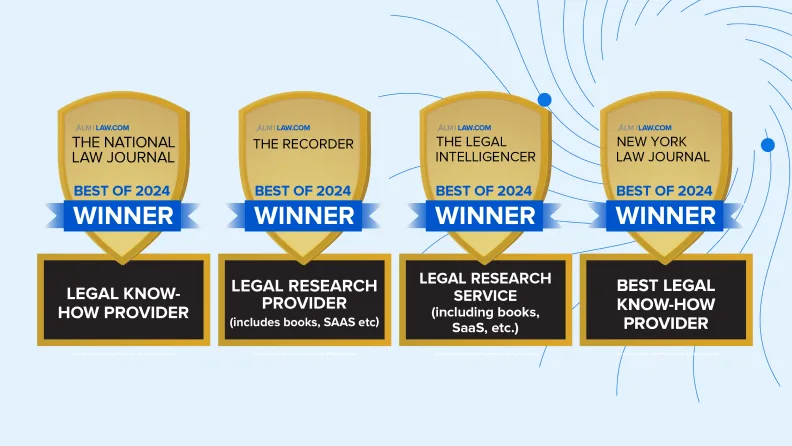What it means to be an Artificial Intelligence (AI) lawyer and how AI might impact your role within evolving AI regulations to provide strategic counsel
Reviewed by Amanda OKeefe, Director, Global Data Privacy & Cybersecurity, Thomson Reuters
Highlights
- An AI lawyer is a licensed attorney who not only leverages AI tools to enhance productivity and streamline workflows, but also advises clients on navigating the rapidly evolving legal and regulatory landscape of AI.
- AI law is not a distinct area of specialty but is present in every domain, requiring attorneys to help clients adapt by monitoring regulations, assessing risks, and establishing robust AI governance frameworks.
- While AI solutions offer significant advantages by accelerating research and compliance monitoring, lawyers must mitigate inherent risks by carefully scrutinizing AI tool agreements, particularly provisions on licensing, privacy, and risk management.
According to the 2025 Future Professional Report by Thomson Reuters, 96% of survey respondents have at least a basic awareness of AI capabilities.
However, developing AI fluency is not just about learning new tools; it’s about integrating AI into the professional’s mindset and workflow — even a paradigmatic shift of work-life balance.
In this article, we’ll explore how AI can be a productivity force multiplier for attorneys, and how AI laws might be impacting your practice area.
Jump to ↓
What does it mean to be an AI lawyer?
What are relevant areas of law?
How AI amplifies AI lawyer tasks
More resources for AI attorneys
What does it mean to be an AI lawyer?
An AI lawyer is a licensed attorney using AI for work, hence an AI-savvy lawyer. An AI lawyer could also refer to an AI-informed lawyer who must understand and give counsel to the intersections among legal tech solutions, legal frameworks, and ethics. Their goal is to navigate the legal conflicts that arise in AI use and development.
You might find AI tools useful in your practice but must also consider how AI is reshaping how you view the law. In practice, AI touches every type of law, for example:
- privacy
- intellectual property
- torts, employment
- cybersecurity
- consumer protection
- corporate law
AI law is not its own distinct area of specialty but is present in every domain. There is no industry or legal area fully outside the scope of AI tools or regulations. You must review and analyze every context to ensure AI use complies with existing statutes.
Help clients adapt
Staying informed about AI law isn’t optional — it’s a professional imperative. The AI legal landscape is evolving rapidly, with new state laws and regulations, federal guidance, and international developments.
For more on AI-related laws and regulations, see Developments in US AI Law and Regulation: 2025 Tracker.
As a lawyer, your responsibility goes beyond awareness. You must actively help clients adapt to these legal shifts by:
- Monitoring regulatory changes from US federal agencies such as the FTC and EEOC, international bodies such as the EU Commission, and judicial rulings concerning AI-related disputes.
- Developing and maintaining clear and complete documentation that explains how and when a client uses AI systems to make decisions within its business operations— including the AI model purpose, decision logic, and transparency obligations.
- Assessing and mitigating risk, including legal exposure from biased or non-compliant AI outputs.
- Establishing and maintaining appropriate AI governance frameworks to ensure ethical deployment, including — risk controls, human oversight protocols, and data-use policies.
In short, being an AI-informed lawyer means being a proactive legal advisor, not just a reactive problem-solver. Your guidance will shape how your clients build, buy, or deploy AI tools — with legal compliance and public trust in mind.
For more on international AI laws and regulations that have extraterritorial effect, see Practice Note, EU AI Act.

On-demand webinar
Unlocking innovation in law: The future of professionals with strategic AI adoption
Watch on-demand ↗What are relevant areas of law?
How do you look at specific legal fields through the AI lens? Different legal practice areas might require different perspectives. For example:
Commercial transactions
Legal counsel are responsible for handling corporate transactions where the subject matter involves AI systems. Attorneys must understand:
- The nature of the AI system involved in the transaction
- The agree structure, including whether their client is developing or licensing the AI system
- How the AI system operates, including how it is trained, how it operates, what data the model uses as input, what output the model produces, and how that output is used
- The parties involved in the AI system supply chain
You will have to think holistically when structuring a specific deal, taking into consideration representations and warranties, legal protections, and assessing risks and responsibilities between the parties.
To learn more about the most common use cases of AI in the supply chain, see AI in the Supply Chain.
Data protection and privacy
When advising clients on AI-related data protection matters, you must consider data collection, use, processing, disclosure, retention, storage, and security concerns.
You may have to help clients build and enforce trustworthy AI cybersecurity governance frameworks aligned with best practices, for example The National Institute of Standards and Technology (NIST) AI Risk Management Framework.
For more on privacy and data security issues organizations should consider when developing a new product or service, see Identifying Data Protection Issues for a New Product or Service: Artificial Intelligence.
Employment Law
As an AI-informed lawyer, you should understand how your client uses AI in its employment practices, for example by using automated employee tools. You must inform your clients of their responsibility to minimize bias and to ensure the tool is compliant with Equal Employment Opportunity Commission (EEOC) guidelines.
Intellectual Property (IP) Law
AI and related technology can be protected as intellectual property in the form of:
- Patents
- Trade secrets
- Copyrights
Each of these IP forms has benefits and limitations counsel should consider before using them to protect AI. For example, although the US Patent and Trademark Office (USPTO) and the US courts have generally rejected copyright protection for purely AI-generated content, the USPTO may recognize source code and object code as copyrightable literary works.
Generative AI (GenAI)
GenAI tools use large language models (LLMs) to use complex algorithms to generate human-like text, images, code, and other content. Programs such as ChatGPT, MusicLM, and DALL-E are popular versions of GenAI.
GenAI solutions offer significant benefits, but lawyers advising organizations on GenAI use must consider multiple complex risks that can impact their client’s reputation, stakeholder trust, and legal and regulatory compliance obligations. For example:
- Bias in machine learning algorithms
- Creation and dissemination of misinformation
- Uncertainty regarding intellectual property (IP) ownership of AI-generated content.
- Inadvertent disclosure of trade secrets, personal information, or other confidential information
- Errors and inaccuracies in work product
For more information about GenAI legal issues, see Practice Note, Key Legal Issues in Using Generative AI: Overview (US).
AI terms of use: Key issues
Attorneys must advise their clients to fully vet and understand the tools they choose to use. Attorneys must also review and counsel their clients on key legal provisions and conditions that attach to the AI tools.
Key AI components
Lawyers should be familiar with common AI terminology and contract provisions, and understand how the contract terms and conditions impact how their clients can use an AI solution:
- AI license — What is licensed? Is it the model, interface, or outputs?
- Inputs — Understand who owns the inputs and how usage is viewed.
- Outputs — Be clear on the ownership of the outputs and avoid any disclaimers that weaken your rights.
- Customer data — Ensure customer data is adequately safeguarded.
- Training data — Understand what data is included in the training data and what restrictions that data might carry.
- Customizations — Define use and access rights to updates and future versions.
Review legal provisions
As you review the AI solution provider’s agreement, pay careful attention to certain provisions:
- IP and Licensing — Understand how the contract allocates IP rights. Ensure you understand the license conditions and restrictions, and retain rights to the inputs and outputs.
- Privacy and confidentiality — Ensure the personal and business data, including inputs and outputs, are safeguarded and properly use-restricted. Align the provider’s data retention policy and deletion methods timelines with the client’s regulatory obligations. Review your provider’s privacy policy, and other terms and conditions to ensure it fits the client’s compliance needs.
- Risk management — Secure indemnity on infringement protection from the provider for output and training data. Avoid indemnification obligations for the client’s input data.

AI Toolkit
Resources designed to help organizations and their counsel identify potential legal issues concerning AI.
View Toolkit ↗How AI amplifies AI lawyer tasks
AI is truly redefining the legal profession. Lawyers understand that AI offers key advantages, including:
- Accelerated research — Conduct thorough, accurate research faster than ever.
- Streamlined workflow — Enhance productivity by optimizing routine work.
- Increased capacity to strategize — Thomson Reuters Future of Professionals Report states that AI-powered tech will give every professional 200 extra hours in 2025 allowing more time to strategize and advise clients.
For example, an AI-savvy lawyer can use CoCounsel Legal in specific ways to help with legal tasks including:
- Identifying AI regulations — CoCounsel Legal can quickly find relevant cases, statutes, and expert commentary pertaining to data privacy laws related to AI from trusted Westlaw and Practical Law content.
- Analyzing litigation documents — In cases involving alleged AI ethics violations, CoCounsel Legal can analyze complaint documents to identify and highlight potential misinterpretations of AI regulations or fictitious legal precedents cited by opposing counsel.
- Performing due diligence — Evaluate potential infringement issues. You can use an AI to compare the client’s AI tool documentation and existing work to identify copyright issues.
- Compliance monitoring — As changes in regulations happen, AI can provide instant updates to help keep legal professionals current.

CoCounsel Legal
Seamlessly integrated with Westlaw, Practical Law, Microsoft 365, and DMS partners
Work smarter with AI ↗More resources for AI attorneys
Get access to curated AI-related resources by our attorney-editors below when you sign up for a Practical Law free trial, or shop plans.
Toolkits
Practice Notes
- AI Key Legal Issues: Overview (US)
- Practice Note, Generative AI Ethics for Litigators
- Practice Note, Using AI in Law Departments
Regulatory and Policy Developments
- Developments in US AI Law and Regulation: 2025 Tracker
- Developments in US AI Law and Regulation: 2024 Tracker
- EU AI Act
What is Practical Law?
Practical Law is the most trusted and award-winning legal know-how provider. Resources include standard documents, checklists, legal updates, how-to-guides, and more.

92% of customers agree Practical Law helps them get up to speed and practice more efficiently
Over 650 full-time experienced attorney editors globally keeping you up to date
118,000+ total resources across 17 practice areas ensuring comprehensive coverage
134,000+ hours spent in 2024 maintaining and updating resources








